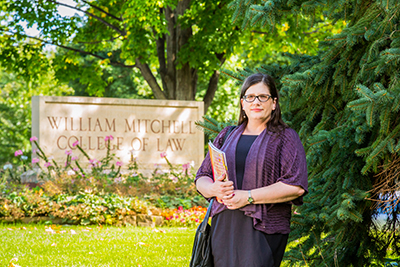By Elizabeth Zach, RCAC staff writer
When Sarah Deer was a college student in Lawrence, Kansas, in the early 1990s, she volunteered at a crisis hotline for battered women where she heard both stories of despair and resilience. Two decades later, one woman in particular remains with her.
“She asked me when the FBI was going to come,” recalls Deer, “and I thought, ‘the FBI wouldn’t respond to this, that’s not what the FBI does.’”
However, the woman was living on a reservation where the state did not have jurisdiction, says Deer. “And whenever there was a violent crime on a reservation, federal authorities would become involved.”
According to an Amnesty International report, more than one in three American Indian and Alaskan Native women will be raped in their lifetime.
It was a pivotal moment for Deer, who is now a professor at William Mitchell College of Law in St. Paul, Minnesota. Earlier this year, Deer was awarded a prestigious John D. and Catherine T. MacArthur Foundation Fellowship – also known as a “genius grant” – worth $625,000 for her research on domestic violence and sexual assault on reservations. At a time when these crimes are garnering renewed significance, with National Football League players and even Bill Cosby drawing more scrutiny, Deer’s work is being recognized for its relevance to the current national debate.
According to an Amnesty International report, more than one in three American Indian and Alaskan Native women will be raped in their lifetime. Prosecutorial limitations on reservation lands make these women particularly vulnerable, as does rural poverty and the lack of affordable housing.
“I hesitate to say poverty causes domestic violence,” says Deer, “but it does make it difficult to be safe. The reason many of these women don’t leave an abusive relationship is because there is nowhere to go. If there was more access to better housing, that would help allow some of them to escape and move to a safe location.”
sarah deer

Deer did not grow up on a reservation, but she is a citizen of the Muscogee (Creek) Nation. When she went to law school at the University of Kansas, she learned about federal Indian law and says she expected it to be strictly pertinent to treaties and land. She was most intrigued, however, when her teachers spoke of jurisdiction, and who has the right to adjudicate laws for any given land or people.
“Tribes need to have the resources to fully exercise their jurisdiction,” she says. “But at the pace we’ve been going, it could take another 50 years.”
In 2007, Deer co-authored “Maze of Injustice,” which examines domestic violence among Native Americans and frames it as an international human rights issue. The book led to a shift in the law governing such crimes—in 2010, Congress passed the Tribal Law and Order Act, empowering tribal courts to better prosecute and sentence violent offenders on reservations. Previously, tribes had scant authority to adjudicate crimes committed on tribal land by non-Native Americans.
“It’s too early to know how effective the law is, or will be,” Deer says. “The system has been broken for well over a century. But on a theoretical level, it certainly offers the potential for more justice.”
The impact of the new law might be strongest among tribes in the American West where federal officials are often far from a reservation and have limited resources.
“The fact is that Native women are subject to a system that is very different from the state system. There are major inequities” ~Sarah Deer
“There are more tribes in the West, so just in terms of numbers, the law should be a help,” she says. “And geographically, the West is significant, too, because the remoteness and isolation are more pronounced.”
Deer was also part of the effort to get Congress to reauthorize the Violence Against Women Act, or VAWA, which, like the 2010 law, was fraught with legislative discord.
“I’m not sure why, other than that there’s ignorance out there,” she says.
Although bipartisan majorities in Congress eventually approved VAWA in 2000, and again in December 2005, conservative Republicans opposed the Act’s renewal in 2012. They objected to extending the Act’s protections to same-sex couples and to provisions allowing battered illegal immigrants to claim temporary visas. After a long legislative battle throughout 2012 – 2013, VAWA was again reauthorized in 2013 and signed by President Barack Obama.
According to Deer, much more work remains. The MacArthur Fellowship will allow her the time and resources she needs to learn the Muscogee language, which could help her in her work. The law, too, awaits improvements. Deer may expand her work beyond domestic violence and sexual abuse.
“Both the 2010 tribal law and VAWA provide very, very nominal changes to the law, in general,” she says. “And I’m interested also in incarcerated Native American women.”
Many of these women, she says, serve their time in federal prison. She cites the case of a Native American woman on the Fort Berthold reservation in North Dakota who committed second-degree murder and was sentenced to 10 years in prison. In a similar case at the time, a white woman who committed the same crime and was tried in state court received probation.
“The fact is that Native women are subject to a system that is very different from the state system,” says Deer. “There are major inequities. What we know is that most reported crimes on reservations are declined by the U.S. attorney. So, they may be reported, but the federal government doesn’t extend many resources to pursuing them. It’s both a cultural and a financial problem.”
“In terms of sexual and domestic violence,” she says, “the statistics are much greater for Native women compared to the rest of the population. You could say that the abuse that started with early settlement never really stopped.”
Photo courtesy of: John D. & Catherine T. MacArthur Foundation. – See more >>
